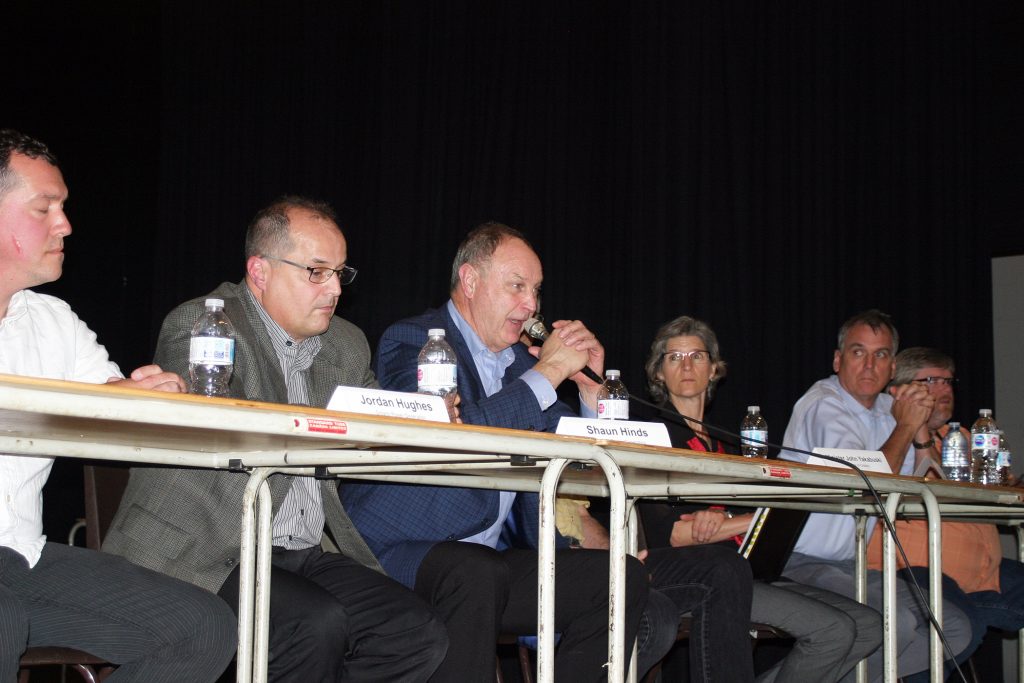MNR to appoint flood ‘advisor’
ARNPRIOR – More than 200 flood-affected residents from Arnprior and beyond filled the St. John Chrysostom Parish Hall on a beautiful Sunday afternoon (June 23) to hear from those responsible for the management of the Ottawa River.
It was the fourth meeting in a weekend of flood meetings along the Ottawa River in Renfrew County – two Saturday in the Pembroke area and two yesterday in Westmeath and Arnprior. Many on the panel were exactly the people those affected by the flood in West Carleton have been waiting to hear from and some from rural Ottawa made the trip to attend.
The Minister of Natural Resources and Forestry, Renfrew-Pembroke-Nipissing MPP John Yakabuski, the Ottawa River Regulation Secretariat (ORRS), the Ministry of Municipal Affairs and Housing and Ontario Power Generation (OPG) executives were all on hand and taking questions from the audience.
The four meetings were all led by the municipality in which they were hosted – in the case of Arnprior’s meeting, Mayor Walter Stack oversaw the meeting with support from McNab-Braeside Mayor Tom Peckett and Horton Township Mayor David Bennett.
The meeting started with some opening remarks from the MPP and a presentation on Ottawa River operations from the secretariat and OPG as well as a brief presentation on provincial disaster assistance from senior municipal financial advisor Steve Seller.

Minister of Natural Resources and Forestry, Renfrew-Pembroke-Nipissing MPP John Yakabuski, left, speaks with a resident following the official ending to yesterday’s meeting. Photo by Jake Davies
“This is your opportunity,” Yakabuski told the audience. “We will answer your questions to the extent that we can. Hopefully at the end of the day, we’ll have a better understanding.”
To boil down the presentations from the ORRS and the OPG, the short answer is they don’t have the ability to eliminate flooding along the Ottawa River. Sixty per cent of the Ottawa River watershed is uncontrolled and the water travels freely to the river.
“There are limits to the regulation of the Ottawa River,” ORRS executive engineer Manon Lalonde said.
Lalonde said the Ottawa River flow varies between 3,600 cubic metres per second to 9,000.
“We exceeded the previous record by 100,” she said.
The river also exceeded its historic peak by 46 per cent this year. Along the river watershed there have been 13 lakes converted to reservoirs by placing a dam along the outlet of those lakes. In total there are 30 reservoirs. There are also 43 hydropower plants.
Most of the large reservoirs are in the north.
“In the spring they started empty,” Lalonde said. “At the end of spring, they were full, that’s how we know it worked. We have always reduced flooding and in many years completely eliminated it. Without the reservoirs things would have been much worse.”
The ORRS’ senior water resources engineer also spoke to the audience.
“What we were looking at was a snowpack 180 per cent higher than normal,” Michael Sarich said. “In the north, the snow was three to four metres deep. That snow melt occurred fairly late in the season. There was particularly heavy precipitation. All tributaries set new historic level peaks. Tremendous amounts of water came into the Ottawa River this year.”
Sarich said the team was as ready as possible for this year’s freshet.
“Operators did recognize there was a lot of snow up there,” he said. “The reservoirs were ready, but then spring didn’t come.”
Sarich said the reservoirs hold about five billion cubic metres of water on average each year. This year that number rose to 5.2 billion.
“What flows down here is about two times that,” Sarich said. “In 2019, more than four times what could be stored, came through.”
Sarich said preventing all flooding is impossible.
“We’ve always had exceptional flooding,” he said. “In the ‘20s, ‘30s, ’40s right up to this year. There is no way to prevent this in the future. There are limitations to our system. The reservoirs are much smaller that the water amounts that flow on the river.”
The OPG’s technical officer Jordan Hughes led its presentation. Eastern operations vice president Shaun Hinds, stakeholder relations advisor Kasey Sleeman and production manager Brent Stajkowski were also present.
“All facilities are remotely operated, monitored 24 hours a day, 365 days a year in ‘real time,’” Hughes said.
OPG does weather surveys, crews who conduct snowfall surveys, they have river gauges and water monitoring tools.
“With all the tools at our disposal, it’s still an inexact science,” Hughes said.
Hughes said the OPG can’t do much during the freshet season.
“It was taken down to its very minimum level until the spring freshet,” he said. “But we’re talking about very low storage. We are discharging exactly what’s coming in.”
Hughes said the Des Joachims Generating Station near Deep River has some storage capability.
“If we filled it, it would have taken 10 hours and then we would have had to continue to discharge exactly what came in,” Hughes said.
The Chenaux Generating Station has even less storage capacity.
“There’s literally no storage at all,” Hughes said. “We could stop the flow completely for 1.7 hours. In conclusion, we’re talking high water and high flows. Flooding can’t always be prevented.”
Following the presentation, the panel took about an hour of questions from the audience. That worked out to about 15 which often were more statement than question. Some of them were words of thanks, but the consensus was clear, many didn’t believe everything they were hearing.
One wanted to know if the conservation authorities could relax their building restrictions to focus on the consideration of the “human factor instead of the fish and turtles.”
“I can answer in the affirmative,” the minister said. “There is already a call for a change within the ministry. We will be looking at that in a much more flexible way than in the past.”
As the questions increased, so did the frustration of the audience.
When OPG vice president Hinds said “the OPG staff’s work during the spring freshet was commendable and I stand by that,” his response was greeted with loud boos from the audience.
“All of us are really ticked off for whatever happened,” one Renfrew County resident said. “Those who were lucky enough to save their homes now face spending $20,000 to $30,000 to protect their homes. I think all of us here feel it was a combination of errors from all of you guys sitting there.”
This drew some large applause from the crowd. Some asked for an independent investigation.
“I thought we had made an offer to someone from another province that has experience to draw some conclusions,” Yakabuski said. “I was updated we did not make that offer. We are now looking at other candidates. I hope to have someone in place to act as an independent advisor very soon. We can’t avoid it and we can’t not do something about it. I haven’t walked in the shoes of those that have been flooded, but I can’t offer any kind of guarantee of what will happen in the future.”
At the end of the meeting Yakabuski thanked those who came out.
“You were tremendously respectful considering what you have been through,” he said.

After the meeting, Yakabuski took some time to speak with West Carleton Online before heading back to Queen’s Park.
“It was a chance to listen to presentations from the river operators and ask questions they felt were most important to them,” he said. “They had that opportunity today and yesterday and were going take what we heard at these meetings and build. We’re appointing a special advisor to do an investigation on the operations and the events of the spring freshet. The meetings we had the last couple of days were the right thing to do to give people an opportunity to speak.”
West Carleton Online asked the minister if he will be attending any meetings in the West Carleton area, to which he made no guarantees.
“I cannot avoid being the Minister of Natural Resources but I’m here because this is my riding,” Yakabuski said. “The municipalities organized these public meetings, I helped facilitate them. I would suggest any municipality that feels a public meeting is necessary, for them to do just that and certainly, if not myself, the local MPPs would certainly be interested in being there as well.”
While not a Royal Commission, Yakabuski says there are some advantages to having a special advisor investigate the issue.
“This is something we can institute in a timely fashion I believe, so that is exactly what we are doing,” he said. “This is something that comes under the authority of a single entity, which is the provincial government. And that’s what we’re going to begin with.”



